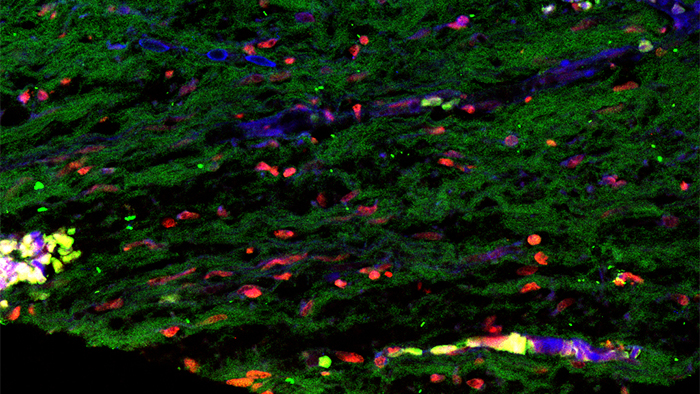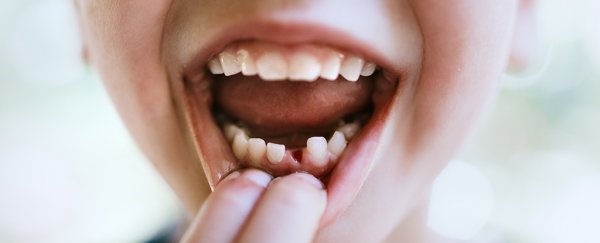Stem cells taken from baby teeth could be used to repair dental injuries and fix dead teeth in the future, according to new research.
Scientists have announced they've been able to use the cells to patch up permanent teeth in children that have not yet fully grown.
The regenerative nature of stem cells – those powerful cells that can morph and divide to repair almost any part of the body – enabled researchers to successfully replenish the soft inner tissue (or dental pulp) in the teeth of 30 patients in a clinical trial in China.
Further down the line the same technique could be used to repair adult teeth as well, replacing the blood vessels and nerve connections that are often gone forever when a tooth take a serious knock.
 Regenerated dental pulp. (University of Pennsylvania)
Regenerated dental pulp. (University of Pennsylvania)
"This treatment gives patients sensation back in their teeth," says one of the team, Songtao Shi from the University of Pennsylvania. "If you give them a warm or cold stimulation, they can feel it; they have living teeth again."
"So far we have follow-up data for two, two and a half, even three years, and have shown it's a safe and effective therapy."
As the researchers point out, nearly half of all kids suffer some kind of injury to a tooth during childhood, and if that happens while their permanent teeth are still growing, blood supply and root development can be affected, sometimes leaving a "dead" tooth.
Dentists already use a treatment called apexification to try and encourage root development, but it's not an ideal solution, and doesn't do anything to replace lost tissue – that dental pulp inside our teeth.
Shi and his team have been working for a decade with dental stem cells taken from baby teeth, technically known as human deciduous pulp stem cells (hDPSC).
The clinical trial most recently carried out involved 30 kids treated with the new method and 10 kids treated using apexification.
For those undergoing the new treatment, stem cells were cultured in a lab and them implanted back into the injured tooth.
The results showed that the injured teeth of the children who had been given hDPSCs had increased blood flow and thicker dentin, as well as more signs of healthy root development. A year afterwards, only those on the new treatment had regained some sensation in their damaged teeth.
One of the kids unfortunately re-injured the same tooth and had to have it extracted – but that did give researchers chance to examine it again. They found the stem cells had regenerated dentin-producing cells, connective tissue and blood vessels, which all help to make up dental pulp.
This is all very encouraging but there's still plenty of work to do.
Broader tests need to be carried out to make sure the procedure works, and the team also wants to explore how stem cells not taken from patients' own baby teeth might react inside the body – when it comes to adult dental injuries of course, the baby teeth will be long gone.
For now mark this down as another encouraging step forward in the field of dental repair.
Last year researchers identified a drug called Tideglusib that can activate stem cells inside the tooth's pulpy centre and potential regrow some of the tissue inside. No human trials have been carried out as yet, but work is ongoing.
If treatments like these can eventually be made reliable and safe enough, we should see more children and adults with a healthier set of teeth.
"For me, the results are very exciting," says Shi. "To see something we discovered take a step forward to potentially become a routine therapy in the clinic is gratifying."
The research has been published in Science Translational Medicine.
